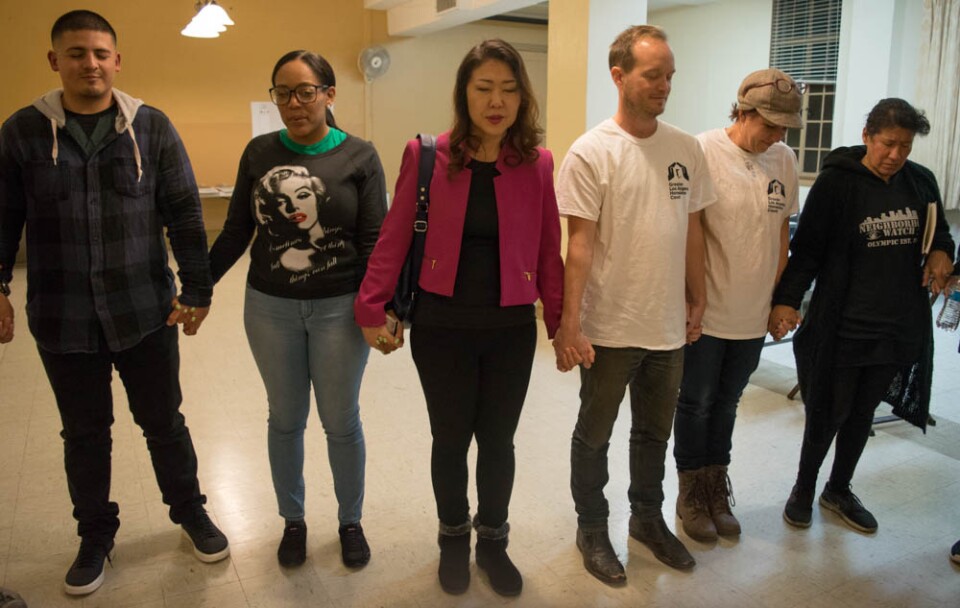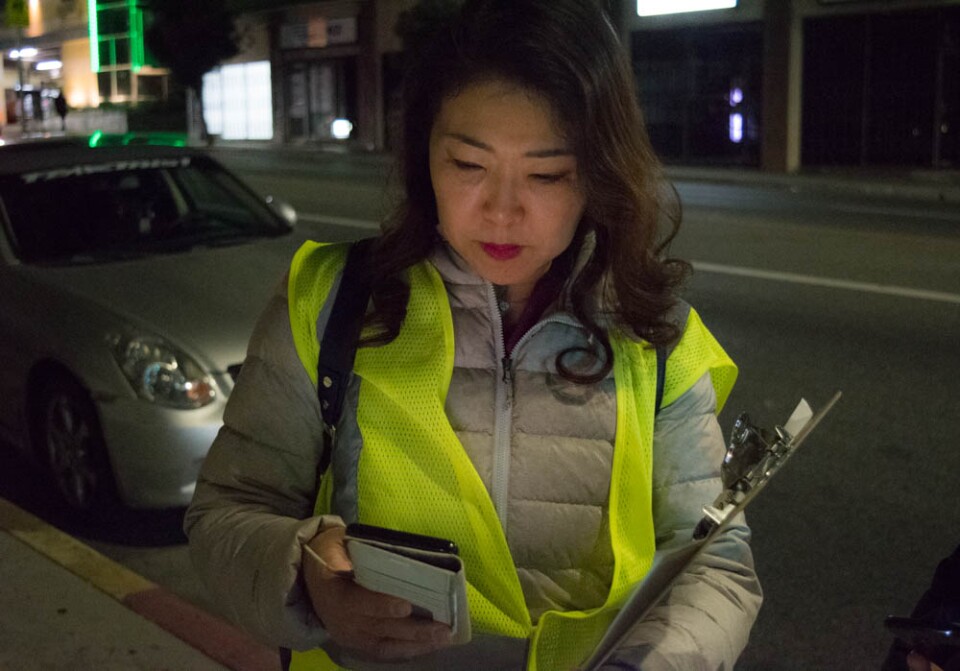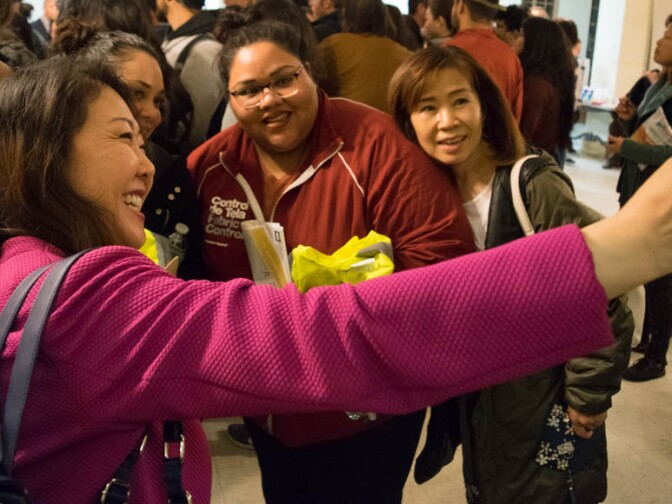This story is free to read because readers choose to support LAist. If you find value in independent local reporting, make a donation to power our newsroom today.
This archival content was originally written for and published on KPCC.org. Keep in mind that links and images may no longer work — and references may be outdated.
LA's Korean Christian community seeking empowerment, social impact
As throngs of volunteers milled around before the 2018 Koreatown Homeless Count, Hyepin Im worked the crowd.
She animatedly chatted with church elders and students alike, and often pulled old friends and new acquaintances aside to snap selfies.
Her phone case is emblazoned with a Wonder Woman logo. Though she didn’t like the recent blockbuster film, Im said she admired Wonder Woman as a little girl.
“My husband bought this for me,” she laughed. “I would never.”
These events are a near-daily occurrence for Im, who has made it her mission to connect the Korean-American Christian community with the outside world as the founder, president and CEO of the nonprofit Faith and Community Empowerment (FACE).
More than 200,000 Korean-Americans live in Los Angeles County, and around 70 percent of Korean-Americans nationwide identify as Christian, based on a 2012 Pew Research Center survey. While Latino and African-American churches have received recognition as major players in Los Angeles, Korean-American Christians had not leveraged the power in their numbers.
“Part of my mission has been to help build bridges, and to help church communities shine their light so that other communities would see, value and welcome our presence and our contribution,” Im said.
In part because of a stereotype of Asians as a “model minority,” said Ruth Chung, University of Southern California professor and expert in Korean acculturation, it is difficult for Korean churches to get resources from the government and other institutions.
“They look at Asian-Americans and say, ‘You guys are fine,’” Chung said.
This stereotype ignores the struggles Korean immigrants face. According to the U.S. Census Bureau’s American Community Survey, 29 percent of Korean households in the United States are linguistically isolated. A 2016 University of California, Los Angeles study found Koreans have the lowest median net worth of any Asian population in Los Angeles and the lowest homeownership rate of any ethnic group.

Churches stepped in to support Korean immigrants through these challenges. Im moved to the United States at age 7 with her parents, who thought they would be doing ministry work through spiritual advising. Instead, Im watched them struggle to serve in roles more akin to “unpaid social workers."
While Korean immigrants needed support, Chung said Korean-American churches’ focus on protecting their own has created tension with some secular organizations.
FACE helps these Korean-American churches reach out by fostering partnerships with media, government and nonprofits, providing specialized services, and advocating for Korean Christians in policy discussions.
In FACE’s office in the heart of Koreatown, Im perches on an upholstered chair in a conference room lined with more than a dozen framed recognition certificates. Her fire engine-red lipstick perfectly matches the shade of her turtleneck, and her impeccably curled hair spirals against her shoulders.
She recounts how after a career in business with GTA Consulting Co., Ernst & Young and the California Science Center, she was inspired in 2001 to start FACE by Revs. Cecil Murray and Mark Whitlock. They headed civic engagement efforts for the predominantly African-American, social justice-focused First African Methodist Episcopal Church.
Whitlock said their model is focused on tracking measurable metrics on social justice projects and giving congregants opportunities to use their existing skills in banking, law, medicine and other careers for social impact.
“It’s a matter of igniting a desire to serve the poor,” Whitlock said. “After igniting, then you have to motivate and provide a platform to volunteer and contribute funds.”
Whitlock said these strategies are transferable to different denominations, ethnic groups and religions.

Im said she found the strategies intriguing because she was “horrified” by the portrayal of Korean-Americans as gun-toting, violent and gang-affiliated after the Los Angeles riots in 1991. She saw the Murray and Whitlock model as a way to improve perceptions of Korean-Americans by highlighting positive engagement across different ethnic groups.
Im also noticed that once Murray's and Whitlock’s efforts gained them a reputation for social impact and community contribution, they were invited to join in policy discussions.
FACE now offers programs on financial literacy, local hiring, leadership training and homeownership. The group also advocates for affordable housing, provides information on mental health services, and hosts events with partners, including the U.S. Department of Housing and Urban Development and the Los Angeles Mayor’s Office. FACE reports that foreclosure prevention efforts have saved $93 million in mortgages.
Daniel Tamm, L.A. Mayor Eric Garcetti’s interfaith liaison, said he works closely with Im to mobilize faith communities on homelessness and immigration issues.
Tamm said he feels like his team is “just scratching the surface” in building relationships with the Korean Christian community, and that he and Im will be partners for a “long time to come.”
While Im has had success building partnerships, she said advocacy can be a roller coaster ride.
“There are certain days when you feel like you are very successful and you know all the answers, and there are other days when you have a lot of self-doubt,” Im reflected. “I thank the Lord for God’s graciousness that there has been enough affirmation that I have kept going and am still standing.”
This story is one in an occasional series of reports by students taking part in a class of the USC Annenberg Knight Program on Media and Religion, headed by Diane Winston. Thanks to a grant from the Luce Foundation, Annenberg students have covered global religion, culture and politics for the past several years. This spring, students will report on Southern California's religious community and will be visiting South Korea.










